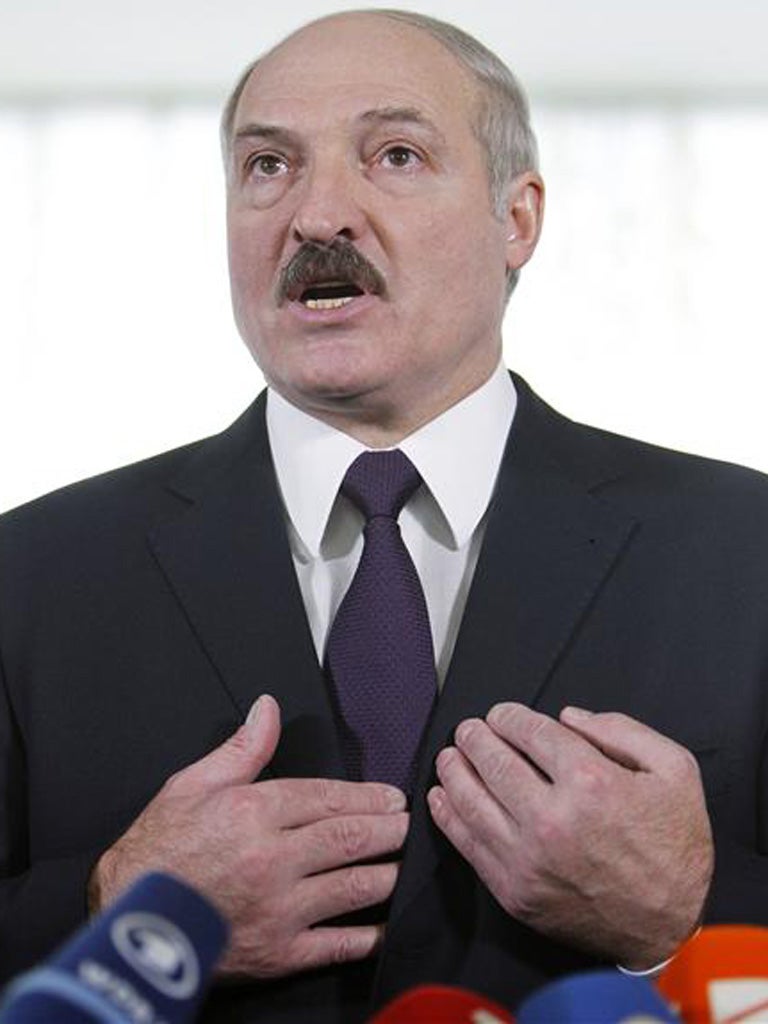Banks halt Belarus deals over repression
Human rights campaigners celebrate Deutsche Bank and BNP Paribas pull-outs

Your support helps us to tell the story
From reproductive rights to climate change to Big Tech, The Independent is on the ground when the story is developing. Whether it's investigating the financials of Elon Musk's pro-Trump PAC or producing our latest documentary, 'The A Word', which shines a light on the American women fighting for reproductive rights, we know how important it is to parse out the facts from the messaging.
At such a critical moment in US history, we need reporters on the ground. Your donation allows us to keep sending journalists to speak to both sides of the story.
The Independent is trusted by Americans across the entire political spectrum. And unlike many other quality news outlets, we choose not to lock Americans out of our reporting and analysis with paywalls. We believe quality journalism should be available to everyone, paid for by those who can afford it.
Your support makes all the difference.Deutsche Bank and BNP Paribas have agreed not to conduct any further deals with the government of Belarus after they were publicly shamed over their business dealings with the authoritarian regime.
The German and French banks, two of Europe's largest financial institutions, were part of a syndicate alongside the Royal Bank of Scotland (RBS) and Russia's Sberbank which agreed to sell £1.2bn in Belarusian bonds in two separate deals in October last year and January.
The second deal was particularly controversial because it came a month after President Alexander Lukashenko ordered the repression of pro-democracy campaigners with mass arrests, beatings and widespread allegations of torture. Over the past 10 months hundreds of opposition activists have been arrested and many of those who stood against Lukashenko in December's disputed elections have since been thrown in jail after show trials condemned by international observers.
In August The Independent reported that RBS had pulled out of future investments with the Belarusian government after senior executives were confronted by dissidents. Now Deutsche Bank and BNP Paribas have followed suit.
Activists from Free Belarus Now and Index on Censorship met with German Chancellor Angela Merkel in Warsaw this month. Irina Bogdanova, sister of the imprisoned presidential candidate Andrei Sannikov – described by Amnesty International as a prisoner of conscience – said the German head of state promised to call the bank.
"I told her [Merkel] that Deutsche Bank's investments are doing nothing to help the Belarusian people," Ms Bogdanova told The Independent.
"I explained that these are investments in a repressive dictatorship. It's like paying for the weapons of repression. She said she agreed and would take it up with the bank."
Deutsche Bank, which was "not aware of any communication from Ms Merkel's office", said it would no longer invest in the government.
BNP Paribas confirmed to The Independent yesterday that it, too, had pulled out of any future deals with Minsk. "After December 19 [the presidential elections] we stopped all our activities in Belarus, except trade related financing," said a spokeswoman.
"Our only action was to close the transactions which we had committed to before 19th December. The bond issuance took place one week after this date for that reason. To date, we are not working on and do not plan any new transactions with the state of Belarus."
The pull-outs will pile pressure on a quasi-Soviet government already facing a rapidly deteriorating economic situation. The rouble has been devalued three times this year, while inflation is heading for 80 per cent, causing food shortages, panic buying and growing internal dissent.
Last week the Belarus central bank began to auction off office items including safes, suitcases, computers and art works to raise revenue. Officials insisted the sale had nothing to do with the country's economic woes, but the move was seized upon by opposition groups who accuse Mr Lukashenko of driving his country into its worst economic crisis since the collapse of the Soviet Union.
Mike Harris, head of advocacy at Index on Censorship, which has led the campaign to shame investors in Belarus, said: "Deutsche Bank, RBS and BNP Paribas were propping up a dictatorship. We're delighted they have pulled out, leaving Lukashenko with few options other than to release his political prisoners.
"Of the original four banks, only Sberbank has yet to say it will not do business with Lukashenko. We will keep campaigning until it does."
Sberbank did not respond to The Independent's requests for a comment.
Join our commenting forum
Join thought-provoking conversations, follow other Independent readers and see their replies
Comments